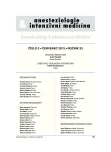-
Medical journals
- Career
How to perform daily rounds in the ICU?
Authors: Matějovič Martin
Authors‘ workplace: 1. interní klinika, Univerzita Karlova v Praze, Lékařská fakulta v Plzni a Fakultní nemocnice Plzeň
Published in: Anest. intenziv. Med., 23, 2012, č. 3, s. 129-132
Category: Intesive Care Medicine - Special Article
Overview
Intensive care medicine is characterized by extreme complexity generating large quantities of highly dynamic data. Daily rounds have become an integral part of critical care medicine, aimed at comprehensive analysis of the data and providing excellent care. To fulfill its role, the structure and process of an ICU round have to be clearly defined. Key components of an ICU round include communication of information within and between all members of the critical care staff, exact assessment of the patient’s status, setting strategic short - and long-term goals, and assignment of tasks and responsibilities. This article summarizes the basic aspects of an ideal ICU round and discusses a quality checklist that must be carried out for every critically ill patient.
Keywords:
clinical round – intensive care unit – critical illness – checklist – quality of care
Sources
1. Golden, R. L., Osler, W. et al. An overview of a life. JAMA, 1999, 282, 23, p. 2252–2258.
2. Pronovost, P. J., Jenckes, M. W., Dorman, T., Garrett, E., Breslow, M. J., Rosenfeld, B. A., Lipsett, P. A., Bass, E. Organizational characteristics of intensive care units related to outcomes of abdominal aortic surgery. JAMA, 1999, 281, 14, p. 1310–1317.
3. Manthous, C., Nembhard, I. M., Hollingshead, A. B. Building effective critical care teams. Crit. Care, 2011, 15, 4, p. 307.
4. Kennedy, M. M., Baker, D. J., Gurses, A. P., Pronovost, L. Creating the ideal ward round. In Flaatten, Moreno, Putensen, Rodes (eds). Organization and management of intensive care. MWV, 2010, p. 259–268.
5. Vincent, J. L. Give your patient a fast hug (at least) once a day. Crit. Care Med., 2005, 33, 6, p. 1225–1229.
6. Patel, S. B., Kress, J. P. Sedation and Analgesia in the Mechanically Ventilated Patient. Am. J. Respir. Crit. Care Med., 2011, [Epub ahead of print].
7. Prowle, J. R., Echeverri, J. E., Ligabo, E. V., Ronco, C., Bellomo, R. Fluid balance and acute kidney injury. Nat. Rev. Nephrol., 2010, 6, 2, p. 107–115.
8. Drakulovic, M. B., Torres, A., Bauer, T. T., Nicolas, J. M., Nogué, S., Ferrer, M. Supine body position as a risk factor for nosocomial pneumonia in mechanically ventilated patients: a randomised trial. Lancet, 1999, 354, 9193, p. 1851–1858.
9. Egi, M., Finfer, S., Bellomo, R. Glycemic control in the ICU. Chest, 2011, 140, 1, p. 212–20.
10. Schweickert, W. D., Kress, J. P. Implementing early mobilization interventions in mechanically ventilated patients in the ICU. Chest, 2011, 140, 6, p. 1612–1617.
11. Cook, D. J., Crowther, M. A. Thromboprophylaxis in the intensive care unit: focus on medical-surgical patients. Crit. Care Med., 2010, 38, S76–S82.
12. Guillamondegui, O. D., Gunter, O. L. Jr, Bonadies, J. A., Coates, J. E., Kurek, S. J. et al. Practice management guidelines for stress ulcer prophylaxis. Eastern Association for the Surgery of Trauma (EAST), 2008, 24 p.
13. Doporučení představenstva ČLK č. 1/2010 k postupu při rozhodování o změně léčby intenzivní na léčbu paliativní u pacientů v terminálním stavu, kteří nejsou schopni vyjádřit svou vůli.
Labels
Anaesthesiology, Resuscitation and Inten Intensive Care Medicine
Article was published inAnaesthesiology and Intensive Care Medicine

2012 Issue 3-
All articles in this issue
- How to perform daily rounds in the ICU?
- Mechanical circulatory support devices
- Therapeutical hypothermia after cardiac arrest
- Current position of exctracorporeal membrane oxygenation (ECMO) in the treatment of respiratory and circulatory failure in children
- Blood transfusion in children and neonates
- Anaesthesiology and Intensive Care Medicine
- Journal archive
- Current issue
- Online only
- About the journal
Most read in this issue- Blood transfusion in children and neonates
- Mechanical circulatory support devices
- Current position of exctracorporeal membrane oxygenation (ECMO) in the treatment of respiratory and circulatory failure in children
- How to perform daily rounds in the ICU?
Login#ADS_BOTTOM_SCRIPTS#Forgotten passwordEnter the email address that you registered with. We will send you instructions on how to set a new password.
- Career

